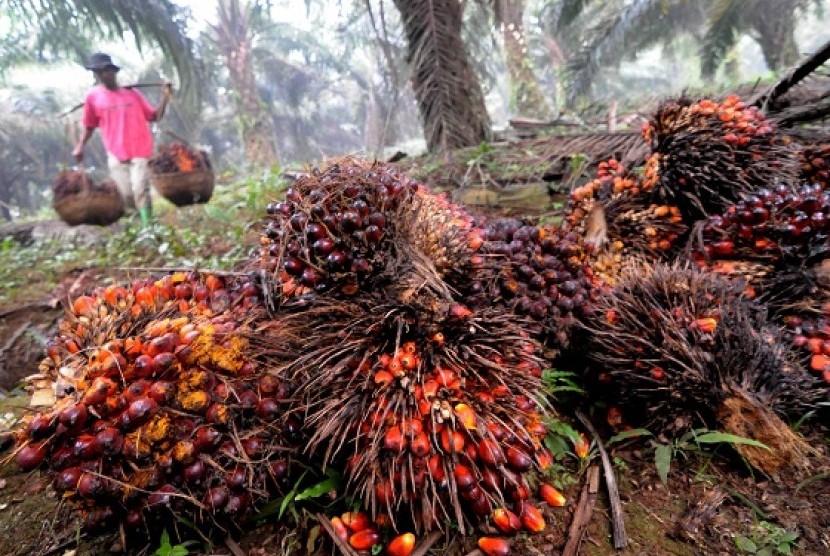REPUBLIKA.CO.ID, JAKARTA -- Indonesia's palm oil plantation and processing industries contribute significantly to the national economy as well as to the welfare of farmers.
Driven by increased global demand and higher yields, Indonesian farmers and conglomerates continue to increase palm oil cultivation.
Data from the Ministry of Agriculture show that the total area under palm oil plantation in Indonesia is currently around eight million hectares. The area under cultivation is expected to increase to 13 million hectares by 2020.
At the opening ceremony of the ninth Indonesian Palm Oil Conference and 2014 Price Outlook on Thursday in Bandung, West Java, President Susilo Bambang Yudhoyono said it was important for Indonesia's palm oil industry to remain strong, sustainable and competitive.
"It is only by being competitive and sustainable that the industry will be able to remain unaffected by problems," the head of state said in his speech.
To ensure the domestic palm oil industry remains strong, sustainable and competitive, the president said a number of international issues, such as trade barriers and environmental issues, need to be addressed.
Organized by the Indonesian Palm Oil Association (GAPKI), the conference will focus on the industry value chain, market volatility, global market trends and the outlook for prices for the next year.
The conference theme is "Managing the Market: Strengthening the Industry Value Chain" and aims to showcase the latest developments in the palm oil industry value chain.
"This annual conference is very important for Indonesia because the global economic situation will have implications for the country's palm oil industry," the President noted.
He added that a weakening of the global economy had resulted in declining palm oil demand, prices and exports, which need to be addressed immediately.
GAPKI Chairman Joedly Bachrieny said the two-day conference aims to focus on strengthening the value chain and infrastructure of the palm oil industry in Indonesia, the challenges for the vegetable oils industry in the coming decades, short- and long-term price forecasts and market trends for the next year.
"This conference will serve as one of the most important events for stakeholders to acquire the most updated and accurate information on the palm oil industry. It will also be a great opportunity for them to expand their business networks," he added.
He pointed out that the conference would also present an array of prominent speakers who are industry experts.
In addition, an exhibition will also be organized to provide information on the latest developments in technology, products and services for the palm oil industry, he added.
He said the exhibitors would represent every relevant industry, such as civil design, construction and engineering, environment and green technology, human resource development, information technology, transportation and logistics, environmental management, waste and water management and telecommunications as well as national and regional government agencies, consultancies, investment banks and financial institutions and oil processing and distribution companies.
"Attended by 1,307 participants from 27 countries, this year's Palm Oil Conference & Price Outlook is expected to provide an excellent opportunity to build business networks within the international palm oil industry," he noted.
The GAPKI chairman added that the conference will also provide the latest information on the vegetable oils industry and its challenges in the coming decades, as well as forecasts of crude palm oil prices in 2014.
He noted that with palm oil plantations spread across eight million hectares and generating more than 25 million tons of output every year, Indonesia is the world's largest producer of palm oil.
He added that the palm oil industry in Indonesia employs four million workers and generates foreign exchange of around US$21 billion, making it the second-largest foreign exchange generator after oil and gas.
In addition to serving traditional markets, Indonesia is also hoping to increase efforts to produce biofuels.
The palm oil industry plans to expand the area under cultivation by four million hectares for biofuel production by 2015.
Joedly expressed hope that the development of the palm oil industry would be supported by the infrastructure development blue print in the Master Plan for Acceleration and Expansion of Indonesia's Economic Development (MP3EI).
Nowadays, the palm oil industry ranks among the most important segments within the global oil seeds industry as new uses of palm oil, especially in the renewable energy sector, increase.
Indonesia, as the largest palm oil producer, plays a very significant role, with global market prices of palm oil taking their cue from Indonesian palm oil supplies.
Therefore, it is very important for the Indonesian Palm Oil Association to update industry stakeholders on price and market trends.
Policies, sustainability and trade expansion also need to be addressed. (Otniel Tamindael)


